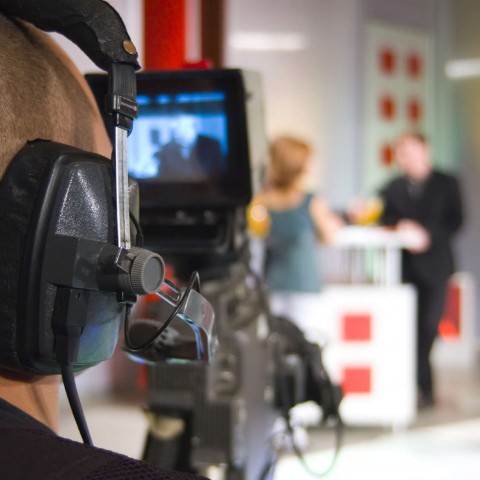In Thailand, there’s a saying we apply to our daily interactions with others: ไปมาลาไหว้ (bpai-maa-laa-wâi). In English, this means: “You should say hello and goodbye when you meet and part from each other.”
If you read our article on How to Say Hello in Thai, you’re already halfway there! Today, we’re going to teach you some different ways to say goodbye in Thai so that you can end your conversations with social finesse!
By using these popular Thai goodbye phrases, you’ll sound more like a native speaker and will more easily form long-lasting relationships with natives. As you study them, you’ll also gain more cultural insight about Thailand and her people!
What are you waiting for? Start with a bonus, and download the Must-Know Beginner Vocabulary PDF for FREE!(Logged-In Member Only)
 Table of Contents
Table of Contents
- Before We Start…
- Specific Ways to Say Goodbye in the Thai Language
- Phrases to Accompany Your Goodbye
- Actions Thai People Do When Saying Goodbye
- Conclusion
1. Before We Start…
Before we teach you how to say goodbye in Thai, let’s look at some new vocabulary:
- คำอำลา (kham-am-laa) – “farewell word”
- ลาก่อน (laa-gàawn) – “goodbye”
Keep in mind that the second word, ลาก่อน (laa-gàawn), is rarely used in day-to-day life.
Instead, the most common way to say goodbye in Thai is สวัสดี (sà-wàt-dii), which means “goodness,” “beauty,” “prosperity,” and “safety.” Due to its positive meanings, Thai people use this word for both greetings and farewells.
If you happen to be in Thailand (or meet Thai people elsewhere), and want to impress them, you can always end your conversation with สวัสดี (sà-wàt-dii) and do an action called ไหว้ (wâi).
2. Specific Ways to Say Goodbye in the Thai Language

Apart from saying สวัสดี (sà-wàt-dii), there are a couple of other phrases you can use to say goodbye.
1 – บ๊าย บาย
Thai pronunciation: báai-baai
English translation: “Bye”
Explanation:
This Thai word for goodbye actually comes from English. Thai people often use this in casual situations, usually among friends or family. However, keep in mind that Thai people don’t ไหว้ (wâi) when saying this; instead, they just wave goodbye.
Example:
หนูไปหาเพื่อนก่อนนะแม่ บ๊ายบาย
nǔu-bpai-hǎa-phûuean-gàawn-ná-mâae báai-baai
“I am going to meet my friend now. Bye.” [Talking to your mother]

I am going to meet my friend now. Bye.
2 – แค่นี้นะ
Thai pronunciation: khâae-níi-ná
English translation: “Bye”
Explanation:
This is how to say goodbye in Thai before hanging up the phone.
Example:
เดี๋ยวพรุ่งนี้เจอกัน แค่นี้นะ
dǐiao-phrûng-níi-jooe-gan khâae-níi-ná
“See you tomorrow. Bye.”
3. Phrases to Accompany Your Goodbye
There are various phrases that Thai people say together with สวัสดี (sà-wàt-dii). Some of these phrases are similar to their English counterparts, which should give you a healthy head-start!
1 – ขอตัวก่อน
Thai pronunciation: khǎaw-dtuua-gàawn
English translation: “I have to go.”
Explanation:
You can use this phrase in formal situations, such as in business meetings or when you speak to elders. You should say this phrase before saying สวัสดี (sà-wàt-dii).
Example:
หลังจากนี้ ผมมีนัดลูกค้าอีกท่านไว้ ต้องขอตัวก่อนครับ สวัสดีครับ
lǎng-jàak-níi phǒm-mii-nát-lûuk-kháa-ìik-thâan-wái dtâawng-khǎaw-dtuua-gàawn-khráp sà-wàt-dii- khráp
“I have an appointment with another customer after this. I have to go now. Goodbye.”

I have an appointment with another customer after this. I have to go now. Goodbye.
2 – ขอตัวกลับก่อน / กลับแล้ว
Thai pronunciation: khǎaw-dtuua-glàp-gàawn / glàp-láaeo
English translation: “I’m heading home.”
Explanation:
This phrase is suitable for specific situations, namely when you’re about to leave for home. You should say it before สวัสดี (sà-wàt-dii) or บ๊าย บาย (báai-baai). The difference between the two phrases is that ขอตัวกลับก่อน (khǎaw-dtuua-glàp-gàawn) is used in formal situations, while กลับแล้ว (glàp-láaeo) is used in casual situations.
Example 1:
วันนี้ฉันรู้สึกไม่ค่อยดี ต้องขอตัวกลับก่อน สวัสดีค่ะ
wan-níi-chǎn-rúu-sùk-mâi-khâauy-dii dtâawng-khǎaw-dtuua-glàp-gâawn sà-wàt-dii-khà
“I’m not feeling well today. I’m heading home. Goodbye.”
Example 2:
กลับแล้วนะ จะรีบไปดูละคร บ๊าย บาย
glàp-láaeo-ná jà-rîip-bpai-duu-lá-khaawn báai-baai
“I’m heading home now, as I want to get back in time for the TV drama. Bye.”
3 – ขอตัวไปก่อน / ไปแล้ว
Thai pronunciation: khǎaw-dtuua-bpai-gàawn / bpai-láaeo
English translation: “I have to go.”
Explanation:
Despite having the same meaning as ขอตัวก่อน (khǎaw-dtuua-gàawn), these phrases are used in different situations. You should say them before สวัสดี (sà-wàt-dii) when you’re leaving to go somewhere (but not to your place). The difference between the two phrases is that ขอตัวไปก่อน (khǎaw-dtuua-bpai-gàawn) is used in formal situations, while ไปแล้ว (bpai-láaeo) is used in casual situations.
Example 1:
ครูคะ หนูขอตัวไปก่อนนะคะ สวัสดีค่ะ
khruu-khá nǔu-khǎaw-dtuua-bpai-gâawn-ná-khá sà-wàt-dii-khà
“I have to go. Goodbye.” [Talking to your teacher]
Example 2:
ไปแล้วนะ เดี๋ยวออกสายแล้วรถติด บ๊าย บาย
bpai-láaeo-ná dǐiao-àawk-sǎai-láaeo-rót-dtìt báai-baai
“I have to go now or else the traffic will be really bad. Bye.”
4 – แล้วเจอกัน
Thai pronunciation: láaeo-jooe-gan
English translation: “See you.”
Explanation:
You say this phrase before saying สวัสดี (sà-wàt-dii) or บ๊าย บาย (báai-baai).
Example:
ต้องไปแล้วนะ แล้วเจอกันพรุ่งนี้ บ๊าย บาย
dtâawng-bpai-láaeo-ná láaeo-jooe-gan-phrûng-níi báai-baai
“I have to go now. See you tomorrow. Bye.”
5 – แล้วจะมาใหม่
Thai pronunciation: láaeo-jà-maa-mài
English translation: “I will come back again.”
Explanation:
You say this phrase before saying สวัสดี (sà-wàt-dii) or บ๊าย บาย (báai-baai).
Example:
ยายขา หนูกลับแล้วนะคะ แล้วจะมาเยี่ยมใหม่ค่ะ สวัสดีค่ะ
yaai-khǎa nǔu-glap-láaeo-ná-khá láaeo-jà-maa-yîiam-mâi sà-wàt-dii-khà
“I am going home now, but I will come back to visit you again. Goodbye.” [Talking to your grandmother]
6 – ขอลาไปก่อน / ขอลาไปแต่เพียงเท่านี้
Thai pronunciation: khǎaw-laa-bpai-gàawn / khǎaw-laa-bpai-dtàae-phiiang-thâo-níi
English translation: “This is the end of the show.” (Not literal translation)
Explanation:
This phrase is used only in TV shows or news channels before the words สวัสดี (sà-wàt-dii).
Example 1:
ช่วงนี้ฝนตก ท่านผู้ชมระวังรักษาสุขภาพด้วย ต้องขอลาไปแต่เพียงเท่านี้ สวัสดีครับ
chûuang-níi-fǒn-dtòk thâan-phûu-chom-rá-wang-rák-sǎa-sùk-khà-phâap-dûuai dtâawng-khǎaw-laa- bpai-dtàae-phiiang-thâo-níi sà-wàt-dii-khráp
“It has been raining a lot recently, so please take care of your health. This is the end of the show. Goodbye.”
Example 2:
ขอขอบคุณแขกรับเชิญทุกท่าน ขอลาไปก่อน สวัสดีค่ะ
khǎaw-khàawp-khun-khàaek-ráp-chooen-thúk-thâan khǎaw-laa-bpai-gàawn sà-wàt-dii-khà
“Thank you to all the guests today. This is the end of the show. Goodbye.”

Thank you to all the guests today. This is the end of the show. Goodbye.
7 – เดินทางปลอดภัย / เดินทางดี ๆ นะ
Thai pronunciation: dooen-thaang-bplàawt-phai / dooen-thaang-dii-dii-ná
English translation: “Have a safe trip.”
Explanation:
Thai people often wish or bless other parties to have a safe trip when saying goodbye. The difference between the two phrases is that เดินทางปลอดภัย (dooen-thaang-bplàawt-phai) is used in formal situations, while เดินทางดี ๆ นะ (dooen-thaang-dii-dii-ná) is used in casual situations.
Example 1:
ดึกแล้ว เดินทางดี ๆ นะ บ๊าย บาย
dùek-láaeo dooen-thaang-dii-dii-ná báai-baai
“It is late at night now, so I hope you have a safe trip. Bye.”
Example 2:
ขอบคุณที่ใช้บริการ ขอให้ทุกท่านเดินทางปลอดภัย สวัสดีค่ะ
khàawp-khun-thîi-chái-baaw-rí-gaan khǎaw-hâi-thúk-thâan-dooen-thanng-bplàawt-phai sà-wàt-dii- khà
“Thank you for using our service. We hope you have a safe trip. Goodbye.”
8 – ขอบคุณสำหรับ…
Thai pronunciation: khàawp-khun-sǎm-ràp-wan-níi
English translation: “Thanks for ___.”
Explanation:
Thai people say this phrase to show that they’re thankful for something the other party did or offered to do.
Example:
ขอบคุณสำหรับอาหารเย็นวันนี้ อร่อยมากค่ะ ตอนนี้ต้องขอตัวกลับก่อน สวัสดีค่ะ
khàawp-khun-sǎm-ràp-aa-hǎan-yen-wan-níi a-ràauy-mâak-khà dtaawn-níi-dtâawng-khǎaw-dtuua- glàp-gàawn sà-wàt-dii-khà
“Thanks for the dinner today. It was delicious. Now, I have to go back home. Goodbye.”
9 – ดูแลตัวเองดี ๆ นะ
Thai pronunciation: duu-laae-dtuua-eeng-dii-dii-ná
English translation: “Take good care of yourself.”
Explanation:
This is what Thai people say to show that they care about the other party.
Example:
พรุ่งนี้เดินทางไปญี่ปุ่นคนเดียว ดูแลตัวเองดี ๆ นะ บ๊าย บาย
phrûng-níi-dooen-thaang-bpai-yîi-bphùn-khon-diiao duu-laae-dtuua-eeng-dii-dii-ná báai-baai
“Tomorrow, you have to go to Japan alone, so take good care of yourself. Bye.”
10 – ดูแลสุขภาพด้วย / รักษาสุขภาพด้วย
Thai pronunciation: duu-laae-sùk-khà-phâap-dûuai / rák-sǎa-sùk-khà-phâap-dûuai
English translation: “Take good care of your health.”
Explanation:
Thai people use these two phrases with people they care about. There’s no difference between these two phrases, and they’re completely interchangeable.
Example 1:
ตอนนี้ไข้หวัดกำลังระบาด คุณตาดูแลสุขภาพด้วยนะคะ สวัสดีค่ะ
dtaawn-níi-khâi-whàt-gam-lang-rá-bàat khun-dtaa-duu-laae-sùk-khà-phâap-dûuai-ná-khá sà-wàt-dii- khà
“This is the flu season, so you have to take good care of your health. Goodbye.” [Talking to your grandfather]
Example 2:
หน้าฝนแล้ว รักษาสุขภาพด้วย สวัสดีค่ะ
nâa-fǒn-láaeo rák-sǎa-sùk-khà-phâap-dûuai sà-wàt-dii-khà
“It is the rainy season now, so take care of your health. Goodbye.”
11 – โชคดีนะ
Thai pronunciation: chôok-dii-ná
English translation: “Good luck.”
Explanation:
This is another phrase to show you care.
Example:
ขอให้โชคดีในการสอบนะ บ๊าย บาย
khǎaw-hâi-chôok-dii-nai-gaan-sàawp-ná báai-baai
“Good luck on your test. Bye.”
12 – หายเร็ว ๆ นะ
Thai pronunciation: hǎai-reo-reo-ná
English translation: “Get well soon.”
Explanation:
Thai people usually say this phrase after visiting someone they know in the hospital.
Example:
ขอให้คุณน้าหายเร็ว ๆ นะคะ หนูขอตัวก่อน สวัสดีค่ะ
khǎaw-hâi-khun-náa-hǎai-reo-reo-ná-khá nǔu-khǎaw-dtuua-gàawn sà-wat-dii-khà
“I hope you get well soon. I have to go now. Goodbye.”
4. Actions Thai People Do When Saying Goodbye
There are a few specific actions Thai people do when saying goodbye to someone. Here are the most popular ones:
1 – ไหว้ (wâi)
As mentioned earlier, a common action that Thai people normally do when saying goodbye is ไหว้ (wâi). This action can be done when saying hello or goodbye in a formal environment. If you’re going to live in Thailand, it’s good to learn how to ไหว้ (wâi), as you’ll want to use it pretty often.

สวัสดี [sà-wàt-dii]
2 – Hug
Thai people who are close to each other may also hug before saying goodbye.
3 – Wave
In informal situations, such as among friends, Thai people also wave while saying บ๊าย บาย (báai-baai).

See you tomorrow.
5. Conclusion
Now you know how to say goodbye in Thai! After reading this article, you should never be at a loss for words when it’s time to part ways.
How do you say goodbye in your country? Is there much difference? Let us know in the comments below.
And as usual, if you’re not sure where to go next on ThaiPod101.com, we have some suggestions:
We hope you enjoyed this lesson. สวัสดี (sà-wat-dii)!










